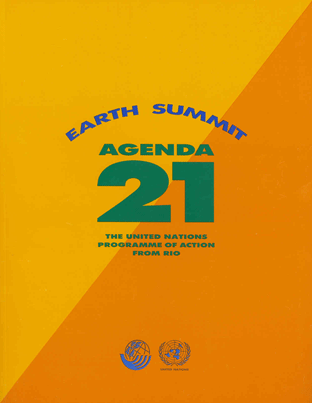Must-see: Agenda 21 Explained:
John Bush of Texans for Accountable Government Exposes Agenda 21 to Dumb Austin City Council
Added: 14. October 2010
Flashback …
Most Americans are unaware that one of the greatest threats to their freedom may be a United Nations program known as Agenda 21. The United Nations Department of Economic and Social Affairs, Division for Sustainable Development created Agenda 21 as a sustainability agenda which is arguably an amalgamation of socialism and extreme environmentalism brushed with anti-American, anti-capitalist overtones.
A detailed history on sustainable development, definitions, and critical actions can be found here. Section III of the Agenda 21 Plan addresses local community sustainable development. The Preamble and Chapter 28 discuss how Agenda 21 should be implemented at a local level. The United Nations purposely recommends avoiding the term Agenda 21 and suggests a cleverly named alternative: “smart growth.” The United Nations Millennium Papers – Issue 2 (page 5) says this of Agenda 21 and smart growth:
Participating in a UN-advocated planning process would very likely bring out many of the conspiracy-fixated groups and individuals in our society such as the National Rifle Association, citizen militias and some members of Congress. This segment of our society who fear ‘one-world government’ and a UN invasion of the United States through which our individual freedom would be stripped away would actively work to defeat any elected official who joined ‘the conspiracy’ by undertaking LA21. So, we call our process something else, such as comprehensive planning, growth management, or smart growth [emphasis added].
Undoubtedly, residents of any town, county, or city in the United States that treasure their freedom, liberty, and property rights couldn’t care less whether it’s called Agenda 21 or smart growth. A recent example of this can be found in Carroll County, Maryland, where a smart growth plan called Pathways was drafted by the County Planning Department. The plan, if enacted, proposed a breathtaking reshuffling of land rights:
- Rezoning of thousands of acres of beautiful, low-density agricultural farmland and protected residential conservation land into office parks
- Down-zoning of agriculture land to prevent future subdivision by farmers
- Up-zoning of low-density residential land around small towns into higher density zoning to permit construction of hundreds or possibly thousands of inclusive housing units, including apartments and condominiums
- Inclusive housing with placement of multi-family construction on in-fill lots within existing residential single family communities
- Endorsement of government-sponsored housing initiatives (subsidies) to ensure healthier, balanced neighborhoods
Carroll County, Maryland is one of 1,168 cities, towns, and counties worldwide that are members of the International Council for Local Environmental Initiatives (ICLEI) – Local Governments for Sustainability, which is an international association of local governments as well as national and regional local government organizations that have made a commitment to sustainable development. The ICLEI mission statement closely resembles that of Agenda 21. In fact, the ICLEI has Special Consultative Status with the UN Economic and Social Council and coordinates local government representation in the UN processes related to Agenda 21.
Community leaders working together in Carroll County recently defended their county against overreaching smart growth initiatives. Richard Rothschild, a candidate for Commissioner, emphatically remarks, “Smart growth is not science; it is political dogma combined with an insidious dose of social engineering. Smart growth is a wedding wherein zoning code is married with government-sponsored housing initiatives to accomplish government’s goal of social re-engineering. It urbanizes rural towns with high-density development, and gerrymanders population centers through the use of housing initiatives that enable people with weak patterns of personal financial responsibility to acquire homes in higher-income areas. This has the effect of shifting the voting patterns of rural municipalities from Right to Left.”
Smart growth plans usurp property rights and constitutional rights. Local officials, at the behest of State Government, revise zoning laws to fit into a “smart code” zoning template. A massive reshuffling of property rights ensues. Farmers may lose subdivision rights; conservation land adjacent to population centers may be rezoned into commercial employment centers; and low-density land in small towns is re-designated as growth area and rezoned to accommodate diverse housing including high-density apartments and condominiums.
Finally, a healthy dose of federal- or state-sponsored housing initiatives is embraced to ensure communities are properly balanced. The net effect of these plans is to create highly urbanized population centers throughout otherwise-rural counties, while simultaneously limiting the availability of land for suburban and estate subdivisions, as these are considered an unsustainable waste of land by Agenda 21 disciples.
Clearly, smart growth plans will impact Americans’ future choices in where and how they live. Furthermore, the Environmental Protection Agency (EPA) and other federal and state agencies may attempt to deny grant funds to states and cities that do not adopt smart growth plans.
Most Americans will remain unaware of the implications of smart growth and Agenda 21 until after it is promulgated in their own backyards. Ironically, these plans are more insidious than the Eminent Domain ruling by the Supreme Court in the case of Kelo v City of New London. Under Eminent Domain rulings, property owners usually receive compensation for their losses.
Conversely, smart growth municipal plans, required by statute, enable municipalities to change zoning laws and engage in other regulatory actions that devalue property, restrict off-conveyances, and otherwise erode property values without payment of any compensation to the property owner.
Smart growth has another interesting unintended consequence: it can disrupt conventional alliances and lead to strange political bedfellows. Rural urbanization plans may raise the ire of environmental groups while simultaneously stirring the wrath of both conservative and liberal residents that want to maintain the rural fabric of their communities. Conversely, developers, sensing opportunity, may side with government smart growth bureaucrats in support of these plans.
Regardless of political orientation, two indisputable facts remain. Agenda 21 is a direct assault on private property rights and American sovereignty, and it is coming to a neighborhood near you.
October 28, 2009
By Scott Strzelczyk and Richard Rothschild
Source: The American Thinker
